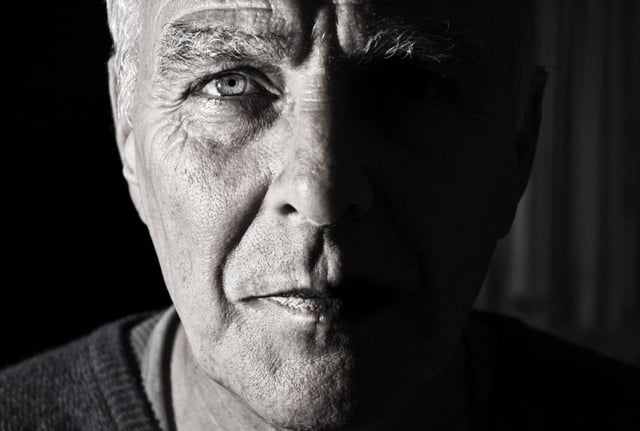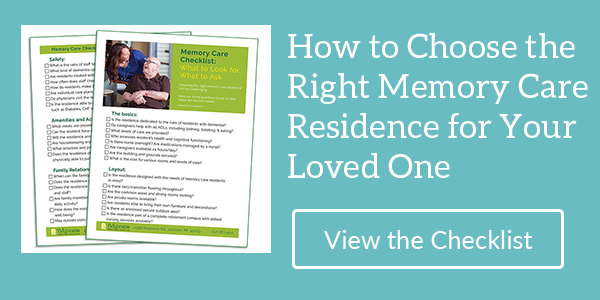
Being able to recognize the early signs of Alzheimer’s disease can be life-saving for an aging loved one – especially if they live alone.
Not only can you keep them from hurting themselves, their pets or others due to their memory loss, but you can also help ease their struggle by connecting them with the right resources and treatments early on.
Do you have an aging parent, family member or friend? Here are the signs you may be to have them evaluated for Alzheimer’s:
Difficulty doing familiar tasks
Daily, run-of-the-mill tasks become immensely difficult once Alzheimer's starts to take its toll. Your loved one may have trouble driving to the grocery store, remembering how to play their favorite card game, or even how to make their morning cup of coffee. Be on the lookout for these changes, and see a doctor if they become common.
Mood and personality changes
Is your once happy and cheery grandmother suddenly suspicious and fearful? Is your aging father more easily agitated and upset? Do they become confused and frustrated more often? Changes to mood and personality – especially changes that become permanent and consistent – may very well point to Alzheimer’s in an older adult.
Overall withdrawal
A common sign of Alzheimer’s is general withdrawal from life, including work, social activities or even hobbies they once loved. Maybe they stop caring about their long-loved favorite sports team, or they’ve skipped their weekly church visits for the past two months. Watch for changes in how they spend their time and what they give their energy to.
Trouble problem-solving
If your loved one is having problems balancing the checkbook, making payments or just generally working with numbers, it may be a sign that Alzheimer’s is en route. Difficulty concentrating and taking longer to deal with challenges are also signs.
Time and place-related confusion
Is your loved one often losing track of time? Do they forget locations or where familiar things are located? Do they often lose things or put items in unusual or strange places? These can all be telltale signs of Alzheimer’s. Forgetting how or when they got to a location is also a common symptom.

Disruptive, daily memory loss
Experiencing memory loss on a daily basis is arguably the biggest and most obvious sign of Alzheimer’s. You may notice they ask you to repeat information over and over, or that they forget important dates or times they’ve always known, like birthdays, holidays, etc. Relying heavily on Post-it notes and other forms of reminders can also signal your loved one is experiencing memory loss.
Visual problems
Sudden problems with reading, determining color or judging distance can all indicate Alzheimer’s may be at work. Make sure to have your loved one evaluated by an ophthalmologist if vision problems persist, as it could indicate cataracts -- another common and debilitating problem for older adults.
Linguistic problems
Does your loved one have problems jumping into a conversation, or do they stop mid-sentence, unable to finish their thought? Linguistic issues are often a sign of Alzheimer’s. Repeating or struggling with words and calling items by the wrong name are also common symptoms.
Poor judgment and decision-making skills
Changes in your loved one’s ability to make sound decisions often points to Alzheimer’s at work. Ask yourself: are they spending their money more frivolously than is normal? Are they taking more risks? Are they showering less often or failing to take care of themselves? These would all point to a decreased judgment and potential Alzheimer’s.
It’s important to remember that every individual is different. Alzheimer’s patients may exhibit one, two or all of the above signs, or they may have none at all. If you notice changes or are worried about your loved one’s health, have them evaluated by a medical professional immediately.

What to Do Next
Your first step is to have your loved one evaluated for Alzheimer’s disease. Schedule an appointment with their doctor, and attend with them to share your concerns.
If they receive an Alzheimer’s diagnosis, ask your doctor about potential treatments. Depending on the stage of their disease, there may be options for slowing its progression. The right combination of medication, therapies and hands-on memory care is crucial to safeguarding your loved one’s cognitive health.
Consider a memory care clinic for support. These facilities offer highly trained dementia care medical professionals and staff members who can help support your loved one – and you, as you deal with the oncoming changes. They can also provide an environment that’s safe, secure and calming for your loved one, who is likely feeling confused and lost by their current state of mind. If this possess seems overwhelming, our "Memory Loss and Memory Care Guide" can help give clarity to the many decisions that go into supporting someone with memory loss.
Other Tips
Make sure to involve the whole family when a loved one is diagnosed with Alzheimer’s. Talk with spouses, children, brothers and sisters about your loved one’s care options, and create a plan to optimize your loved one’s health with the right diet, physical activity and medical care.
Appoint a decision-maker and medical power attorney in case of emergency. You’ll need to call a lawyer to make this official – so do so early on in the event a medical choice must be made on your loved one’s behalf. Enlist the lawyer’s help in drafting your loved one’s will and planning their estate as well; do this as early as possible, while their cognitive abilities will allow them to participate in the planning themselves.
And finally, utilize support groups and ALZ.org, as these provide a wealth of resources to both learn about the disease and the impact it can have on individuals and those who care for them.
Get the Support Your Loved One Needs
At Ganton’s Countryside, we are proud to offer the Brightside Assisted Living & Memory Care facility, which offers a nurturing environment for those facing Alzheimer’s and other dementia-related diseases. To learn more or see our facilities for yourself, please get in touch today.

